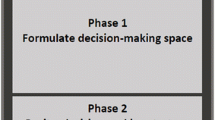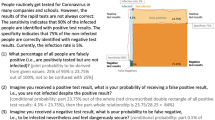Abstract
This paper presents a comparison of the effectiveness of educational decisions taken by means of a holistic-intuitive procedure and a computerized decision support system (DSS). Four groups of teachers were asked to resolve an educational dilemma, first using the holistic procedure and a second time using the DSS program. Each group was given an identical dilemma but at different levels of complexity. Data processing controlled for the participants' educational background and seniority in education. At the lowest level of complexity, the two procedures were similarly effective. The efficiency of holistic decision making declined significantly at higher levels of complexity. Specific factors were identified that contributed to the differences in effectiveness. The findings lead to a deeper understanding of the advantages and limitations of the use of DSS in education.
Similar content being viewed by others
References
Ahituv, N. and Neumann, S. (1990) Principles of Information System for Management.W.C.Brown, NewYork.
Amalberti, R. and Deblon, F. (1992) Cognitive modeling of fighter aircraft process control: A step towards an intelligent on-board assistance system. International Journal of Man-Machine Studies, 36, 639–671.
Cast-Baril, W. L. and Huber, G. P. (1987) Decision support systems for ill-structured problems: An empirical study. Decision Sciences, 18, 350–372.
Edwards, W. (1992) Utility Theories Measurements and Applications. Kluwer Academic, Boston, MA.
Fischer, G. W. (1977) Convergent validations of decomposed multi-attribute utility assessment procedures for risky and riskless decisions. Organizational Behavior and Human Performance, 18, 295–315.
Hammond, K. R. (1996) Human Judgment and Social Policy. Oxford University Press, New York.
Hartman, S. J., Lundberg, O., and White, M. (1990) Effect of background and organizational position on executive planning. Journal of Social Psychology, 130, 801–811.
Herr, E. L. (1977) Decision making and employability skills and the role of cooperative work experience. Tech-nical Education News, 36, 9–11.
Kaniel, S. (2001) The Psychology of Control of Cognition. Bar Ilan University, Ramat Gan.
Klein, J. (1999) The relationship between level of academic education and reversible and irreversible process of probability decision making. Higher Education, 37, 323–339.
Kleinmuntz, D. N. (1990) Decomposition and the control of error in decision analytic models. In Insights in Decision Making: A Tribute to Hillel J. Einhorn, R. Hogarth (ed.). University of Chicago Press, Chicago, pp. 107–126.
Kotlarsky, K. (1982) Thinking as solving problems. Neodidagmata, 15, 157–164.
Lehman, R. L., Lempert, R. O., and Nisbett, R. E. (1988) The effects of graduate training on reasoning: Formal discipline and thinking about everyday life events. American Psychologist, 43, 431–442.
Loy, S. L. (1991) The interaction effects between general thinking skills and an interactive graphics based on DSS to support problem structuring. Decision Sciences, 22, 846–868.
Morera, O. F. and Budescu, D. V. (2001) Random error in analytic hierarchies: A comparison of holistic and decompositional decision strategies. Journal of Behavioral Decision Making, 14, 223–242.
Netz, N. (1988) The Effect of CIA Teachers' Behavior Self-Esteem and Responsibility for Students' Achievements.
Unpublished master's thesis, Bar Ilan University, Ramat Gan, Israel.
Paquette, L. and Kida, T. (1988) The effect of decision strategy and task complexity on decision performance. Organizational Behavior and Human Decision Processes, 41, 128–142.
Payne, J. W., Bettman, J. R., and Johnson, E. J. (1988) Adaptive strategy selection in decision making. Journal of Experimental Psychology: Learning, Memory and Cognition, 14, 534–552.
Ravinder, H. V. (1992) Random error in holistic evaluations and additive decomposition of multiattribute utility-an empirical comparison. Journal of Behavioral Decision Making, 5, 155–167.
Sage, A. P. (1991) Decision Support System Engineering. Wiley, New York.
Shiloh, S., Koren, K., and Zakay, D. (2001) Individual differences in compensatory decision making style and need for closure as correlates of subjective decision complexity and difficulty. Personality and Individual Dif-ferences, 30, 699–710.
Singh, D. T. and Ginzberg, M. J. (1996) An empirical investigation of the impact of process monitoring on computer mediated decision making performance. Journal of Behavior and Human Decision Processes, 67 (2), 156–169.
Slovic, P. and Lichtenstein, S. (1971) Comparison of Bayesian regression approaches to the study of information processing in judgment. Organizational Behavior and Human Process, 6, 649–744.
Telem, M. (1995) Decision support systems in the service of an educational framework. In Education toward the Twenty-First Century, D. Chen (ed.). Ramot, Tel Aviv, pp. 43–72.
Timmermans, D. and Vlek, C. (1992) Multi-attribute decision support and complexity: An evaluation and process analysis of aided versus unaided decision making. Acta Psychologica, 80, 49–65.
Todd, P. and Benbasat, I. (1992) The use of information in decision making: An experimental investigation of the impact of computer-based decision aids. MIS Quarterly, 16, 373–393.
Tversky, A. and Kahneman, D. (1981) The framing of decisions and the psychology of choice. Science, 211, 453–458.
Zakay, D. (1984) The influence of perceived event's controllability on its subjective occurrence probability. The Psychological Record, 34, 233–240.
Author information
Authors and Affiliations
Rights and permissions
About this article
Cite this article
Klein, J. The Effectiveness of Intuitive and Computer-Assisted Educational Decision Making in Simple and Complex Educational Situations. Education and Information Technologies 9, 321–331 (2004). https://doi.org/10.1023/B:EAIT.0000045290.69544.1a
Issue Date:
DOI: https://doi.org/10.1023/B:EAIT.0000045290.69544.1a




